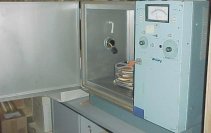Old Recordings Discs Tapes Wires Dictation Belts Other Media
| Should this happen with a tape of yours, stop playing it immediately
and rewind it onto its original reel. Polyester's normal aging process
includes slow absorption of water by the binder that holds the magnetizible
oxide onto the plastic backing. The goop that comes off sticks to
the guides, heads and wheels in the tape path, clogging and blocking
them. Heating the tape under closely controlled parameters effects
a chemical change that lats for a few weeks, during which time the
tape will play well. It has to be copied within this four week window
before it reverts to its former sticky state. I use an environmental
chamber for this task and have performed this task many times with
complete success.
 Another method of dealing with this problem is to store it at stable temperatures just above freezing, say 37 to 40 degrees F, at a low relative humidity. It is still unclear how long tape has to be in this environment before it becomes playable again, but it is months rather than right away as with the oven. This is a good long term strategy for an archive but not useful if a copy is needed quickly. Tape names and numbers exhibiting this problem include but are not limited to: Ampex 406, 407, 456, 457 3M 153, 206, 207, 208, 209, 217, 219, 226, 227, 806, 807, 808, 809, Classic DP, Classic LP, Classic SP, Master and Master SX. Note that because the product name or number is on the box does not assure that this is actually the tape inside. My studio equipment only accommodates ¼" wide tape. The tape baking chamber handles all widths. If you only want me to bake tape for you as you expect to work with it yourself, check with me to be sure the oven is free enough so I can bake it quickly and get it back to you with at least a couple of "good" weeks in it before it goes bad again. A bake costs $ 200. I can put many reels in at one time though I bake groups from each customer separately.
This site ©2001 Steven Smolian. rev 1 |
